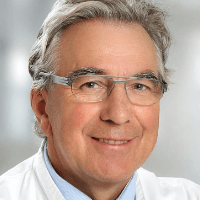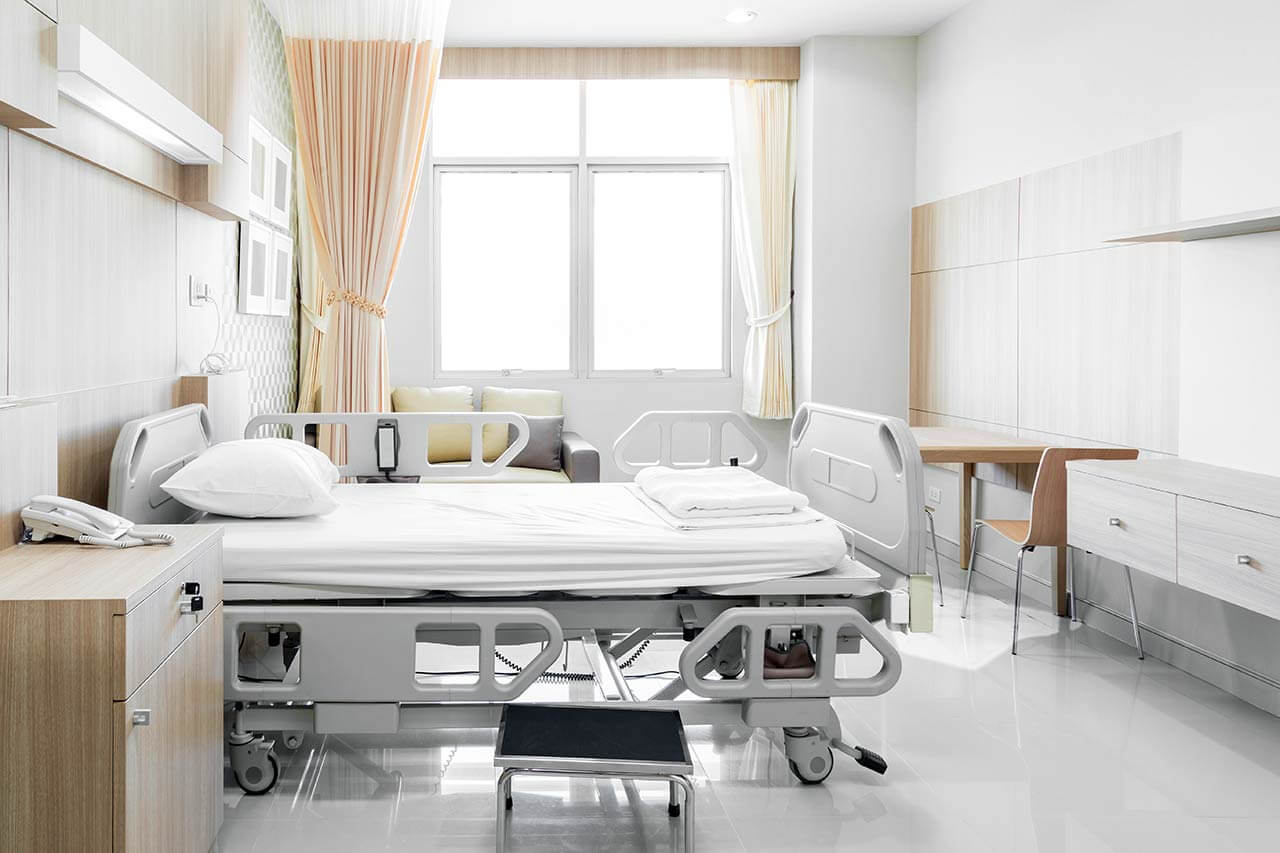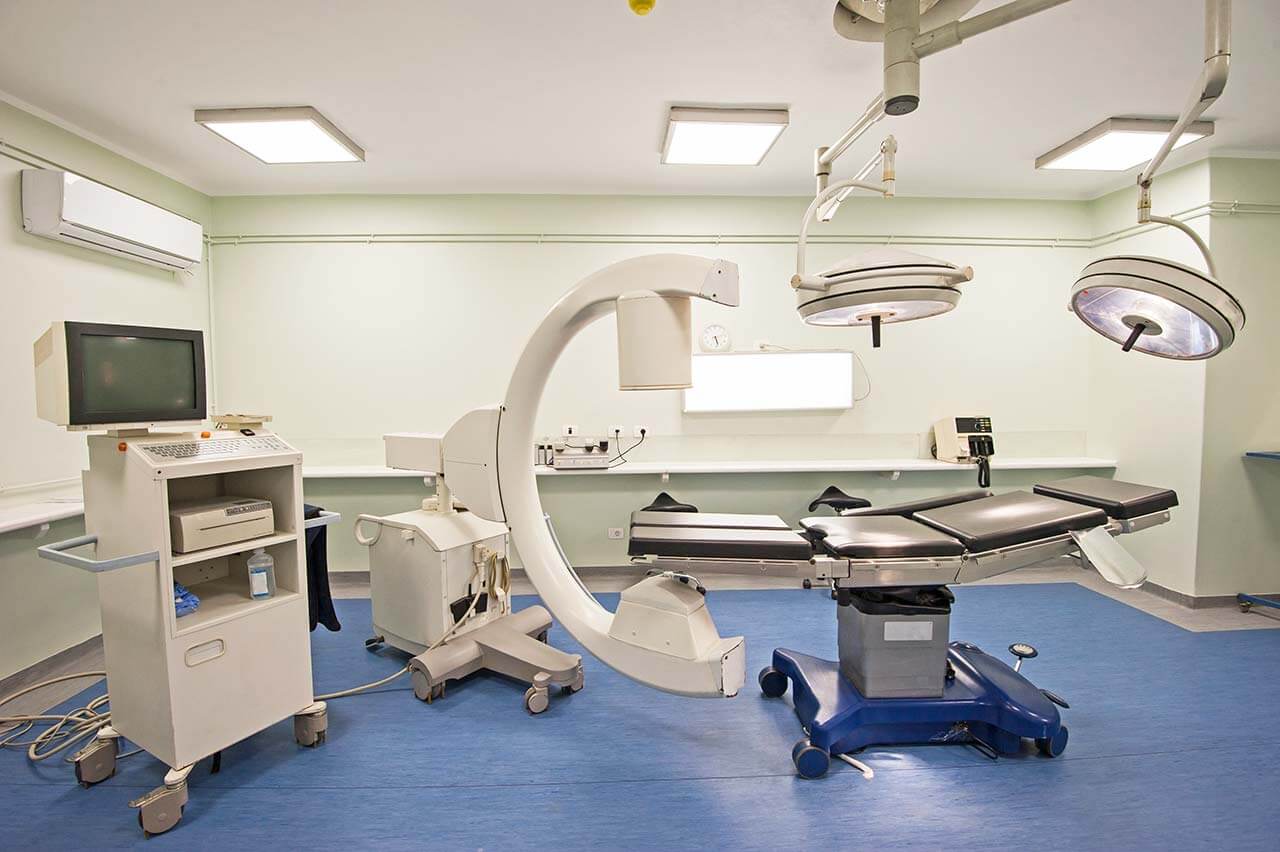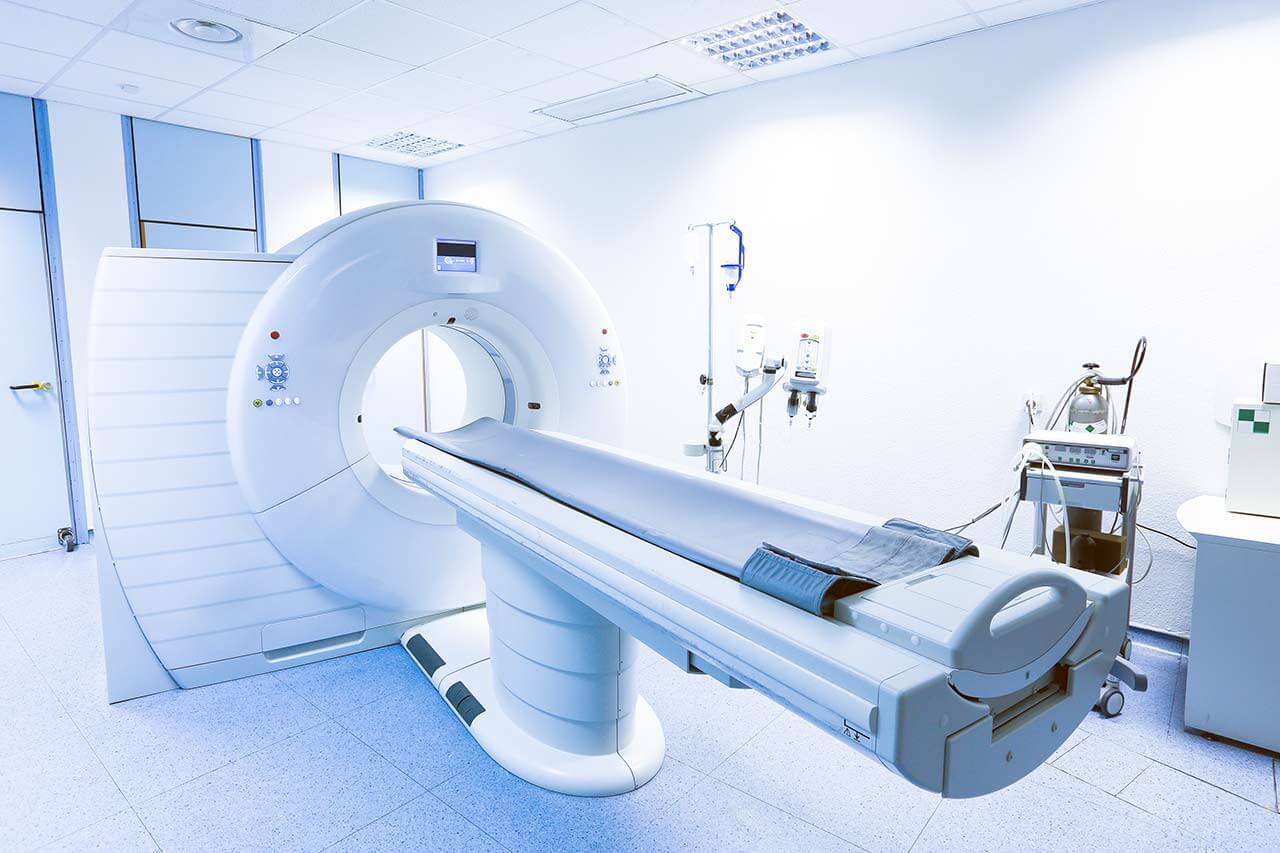
The program includes:
- Initial presentation in the clinic
- clinical history taking
- review of medical records
- physical examination
- laboratory tests:
- complete blood count
- general urine analysis
- biochemical analysis of blood
- TSH-basal, fT3, fT4
- tumor markers
- inflammation indicators (CRP, ESR)
- indicators of blood coagulation
- abdominal ultrasound scan
- CT scan/MRI or PET-CT of abdomen
- preoperative care
- cytoreductive surgery to remove visible tumors
inside the abdomen and HIPEC - histological and immunohistochemical
examination of removed tissues - symptomatic treatment
- cost of essential medicines
- nursing services
- stay in the hospital with a full board
- accommodation in a 2-bedroom ward
- elaboration of further recommendations
How program is carried out
During the first visit, the physician will conduct a clinical examination and go through the results of the available diagnostic tests. After that, you will undergo the necessary additional examination, such as the assessment of liver and kidney function, ultrasound scan and tomography of the abdominal organs. Based on the results of the examination, the physician will choose the surgical technique and the type of anesthesia. After that, preparation according to the preoperative standard will start.
Cytoreductive surgery begins with general anesthesia. The intervention is performed as open surgery, i.e. through the incision in the anterior abdominal wall, so that the surgeon can carefully examine the peritoneum and the surface of the abdominal organs. The surgeon removes affected by the malignant process ovaries, areas of the peritoneum and metastases in other internal organs. This stage of the operation can take several hours, since the overall effectiveness of the treatment depends on the completeness of the malignant tissues removal.
At the next stage of the operation, the surgeon inserts several catheters into the abdominal cavity. Through the catheters, a heated solution of a chemotherapy drug is pumped inside. The special system maintains the required temperature (42-43 degrees Celsius), pressure and circulation rate of the medicinal solution. The solution mechanically flushes out blood clots and remnants of malignant tissues, and a heated chemotherapy drug destroys micrometastases in internal organs and lymph nodes (micrometastases can’t be detected by the naked eye).
After 1-1.5 hours, the chemotherapy drug is removed from the abdominal cavity and the abdominal cavity is washed with saline. After that, the surgeon removes the catheters and sutures the incision of the anterior abdominal wall.
After the completion of the operation, you will be transferred to the ward of the intensive care unit, under the round-the-clock supervision of doctors and nurses. In 1-3 days after the operation, your drains will be removed and you will be transferred to a regular ward for further recovery. The whole treatment takes 10-12 days on average.
Finally, the attending physician will evaluate the results of control examinations, schedule the date of discharge from the hospital and give you detailed recommendations for further follow-up and treatment.
Required documents
- Medical records
- MRI/CT scan (not older than 3 months)
- Biopsy results (if available)
Service
You may also book:
 BookingHealth Price from:
BookingHealth Price from:
About the department
The Department of Gynecology, Mammology and Obstetrics at the Helios Hospital Berlin-Buch offers the full service range in these fields. The department specializes in the treatment of benign and malignant diseases of the female reproductive organs, breast, as well as comprehensive pregnancy management, childbirth and postpartum care. A treatment regimen is developed for each patient individually. Most surgical interventions can be performed using sparing surgical techniques. The department is certified by the German Cancer Society as the Center for Gynecologic Oncology, which indicates strict adherence to national treatment protocols and high quality of treatment. The Chief Physician of the department is Prof. Dr. med. Michael Untch.
In the field of gynecology, the focus is on the treatment of precancerous conditions (cervical dysplasia), benign and malignant pathologies of the uterus and ovaries. Thanks to many effective treatment methods available in the department, each patient receives an individual treatment plan corresponding to her specific clinical indications, stage of pathology, etc. The department annually treats about 5,000 patients, as well as performs more than 3,000 surgical interventions every year. These figures confirm the high effectiveness of treatment and the tremendous experience of doctors. It is also worth noting that during surgical treatment, the surgeons make every effort to preserve the affected organs as much as possible.
The department's mammologists specialize in breast cancer treatment. The scope of their competence also includes the treatment of benign breast changes, such as cysts, fibroadenomas, lipomas, mastopathy, abscesses. To diagnose breast diseases, the department has such modern imaging techniques as ultrasound, mammography, magnetic resonance imaging, computed tomography, positron emission tomography. In addition, it performs all types of breast biopsies, including needle biopsy, vacuum-assisted biopsy, biopsy of the normal and sentinel lymph nodes. To treat the advanced stages of breast cancer, which require radical resection, the doctors carry out reconstructive interventions to restore the aesthetic appearance.
Obstetrics is also a priority in clinical practice. The experienced doctors, obstetricians and nurses work around the clock and do everything possible to make the childbirth as safe as possible for the mother and baby. The department delivers about 3,000 babies annually. The department has three maternity rooms equipped with water baths, which are an excellent alternative to classical childbirth. To relieve pain during childbirth, pain killers, epidural anesthesia, homeopathy, acupuncture, aromatherapy with the use of essential oils can be applied.
The department's range of medical services includes:
- Gynecology
- Outpatient surgery
- Minimally invasive surgery
- Uterine fibroid enucleation
- Endometrial hyperplasia ablation
- Minimally invasive and microsurgical interventions in case of infertility
- Laparoscopic surgery on the uterus, ovaries and fallopian tubes
- Hysterectomy
- Hysteroscopy
- Surgical removal of vaginal, cervical, endometrial, fallopian tube, ovarian and peritoneal tumors
- Chemotherapy for gynecological malignancies (including on an outpatient basis)
- Mammalogy
- Diagnostics
- Mammography, including special modes
- Breast ultrasound scanning
- Galactography
- Biopsy (vacuum and needle), including biopsy of ordinary and sentinel lymph nodes
- Therapy
- Breast surgery (conservative and ablative surgery, plastic reconstructive surgery in breast cancer, breast aesthetic and plastic surgery)
- Sentinel lymph node removal (in collaboration with the Department of Nuclear Medicine)
- Modern chemotherapy and antibody therapy
- Surgical and drug treatment of relapses and metastasis
- Intraoperative radiation therapy
- Genetic counseling for patients with breast cancer in family history
- Psycho-oncological care
- Diagnostics
- Obstetrics
- Integrated management of pregnancy
- Childbirth, including using C-section, water birth
- Pain therapy
- Classic painkillers
- Epidural anesthesia
- Relaxation baths
- Homeopathy
- Acupuncture
- Aromatherapy using essential oils
- Other diagnostic and therapeutic options
Curriculum vitae
Higher Education and Professional Сareer
- 1978 Human Medicine Studies at Ludwig Maximilian University of Munich.
- 1985 State Examination in Human Medicine, Ludwig Maximilian University of Munich.
- 08.1984 - 06.1986 Research Activities within the Cancer Laboratory of the Department of Gynecology at the University Hospital of Ludwig Maximilian University of Munich, Campus Grosshadern.
- Since 06.1986 Assistant Physician in the Department of Gynecology at the University Hospital of Ludwig Maximilian University of Munich, Campus Grosshadern.
- 1987 Thesis defense.
- 06.1990 - 07.1991 Research Fellow, Department of Obstetrics and Gynecology, Section of Gynecologic Oncology, University of Miami.
- Since 08.1991 Responsible for Consultations on Breast Diseases.
- 08.1992 Board certification in Gynecology and Mammology.
- Since 02.1994 Senior Physician in the Department of Obstetrics and Gynecology at the University Hospital of Ludwig Maximilian University of Munich, Campus Grosshadern.
- Since 07.1996 Deputy Chairman of the Comprehensive Cancer Center Munich, Project Team on Breast Cancer.
- 07.1999 Habilitation, PD.
- Since 09.2001 Deputy Head of the Department of Obstetrics and Gynecology at the University Hospital of Ludwig Maximilian University of Munich, Grosshadern Campus.
- Since 01.2006 Head of the Department of Gynecology, Mammology and Obstetrics at the Helios Hospital Berlin-Buch.
Teaching Activities
- Since 1986 Internship in Gynecology and Obstetrics for medical students, participation in the main lecture on Gynecology and Obstetrics, a year of theoretical and practical training for students.
- Since 2002 Lecturer at Ludwig Maximilian University of Munich, Harvard Medical School, Medical Education Alliance (Munich Model for Study of Medicine). The main subject was "Diagnostics and Therapy of Breast Diseases".
- Since 01.2006 Admission to carry out the advanced training courses in Gynecology and Obstetrics of the Berlin Medical Association.
- Since 11.2008 Admission to carry out the advanced training courses in Gynecologic Oncology.
Memberships in Professional Societies
- Since 2000 Commission on the Development of Guidelines for the Working Group on Gynecologic Oncology, Breast Cancer Group.
- Since 2004 Commission on the Development of S3 Guidelines for Breast Cancer Treatment of the German Cancer Society.
- American Society of Clinical Oncology.
- Working Group on Gynecologic Oncology.
- German Society of Obstetrics and Gynecology.
- German Society of Senology.
- Bavarian Cancer Society.
- Board Member of the North-Eastern German Society of Gynecologic Oncology.
- German Society of Ultrasound in Medicine.
- European Society of Mastology.
- Berlin Society of Gynecology and Obstetrics.
- Berlin Cancer Society.
- Federal Association of Senior Physicians in Obstetrics and Gynecology (since 2012 Board Member).
Photo of the doctor: (c) Helios Klinikum Berlin-Buch
About hospital
According to the reputable Focus magazine, the Helios Hospital Berlin-Buch ranks among the top medical facilities in Germany!
The hospital is proud of its rich history, which dates back over 100 years, as well as the status of a maximum care medical center with exceptionally high success treatment rates. The medical institution is an academic hospital of the Charite Medical Complex, which is one of the best in Europe and around the world. To provide its services to patients, the hospital has over 1000 beds, over 60 specialized departments, centers and institutes, including emergency service and a helipad, as well as 23 state-of-the-art operating rooms.
The medical institution presents almost all branches of modern medicine, many of which are certified by professional German societies (for example, certification of the German Cancer Society, German Diabetes Society).
The hospital diagnoses and treats about 52,000 inpatients and more than 144,000 outpatients every year. The medical services and patient care are provided by world-renowned highly competent doctors and qualified nursing staff. To achieve the best treatment results, the doctors of related medical disciplines work closely together and jointly develop optimal treatment regimens.
It is worth noting that the hospital is located in a beautiful green park area. In the immediate vicinity of the hospital one can find Buch Castle, Buch Forest and Barnim Nature Park. All this has a beneficial effect on patients, as they have the opportunity to stroll through beautiful places that inspire and help to gain strength for the successful overcoming of the therapeutic process.
Photo: (c) depositphotos
Accommodation in hospital
Patients rooms
The patients of the Helios Hospital Berlin-Buch live in comfortable rooms made in bright colors. Each patient room is equipped with an ensuite bathroom with shower and toilet. The standard room includes an automatically adjustable bed with a system for calling nursing staff (this system also serves to use TV, radio, lamps), a bedside table, a locker for storing personal belongings, a TV, a radio. The hospital offers WI-FI.
Meals and Menus
The patients of the hospital are offered tasty and balanced three meals a day. Breakfast is served as a buffet with a wide selection of pastries, cereal, sausages and cheese. For lunch, the patients usually have a choice of three menus, including a vegetarian menu. Also, the patient can independently combine a lunch menu from various meat, fish and vegetarian dishes and side dishes. Dinner includes a standard menu and dishes that the patient can choose on his own to his taste.
In addition, the hospital houses a cozy cafe with an excellent assortment of pastries, fresh salads, sandwiches, as well as traditional Berlin dishes. Here you can enjoy a cup of aromatic coffee, hot tea or refreshment drinks.
Further details
Standard rooms include:





